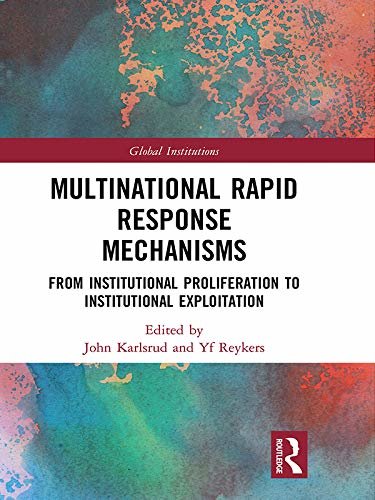
Multinational Rapid Response Mechanisms: From Institutional Proliferation to Institutional Exploitation (Global Institutions) (English Edition)
- 作者
- John Karlsrud、Yf Reykers
- 语言
- 英语
- 出版社
- Routledge 版次:第 1st 版
- 出版日期
- 2018年12月19日
- 纸书页数
- 215页
- 电子书格式
- epub,pdf,mobi,azw3,txt,fb2,djvu
- 文件大小
- 1153 KB
- 下载次数
- 7930
- 更新日期
- 2023-05-04
- 运行环境
- PC/Windows/Linux/Mac/IOS/iPhone/iPad/iBooks/Kindle/Android/安卓/平板
内容简介
The track record of military rapid response mechanisms, troops on standby, ready to be deployed to a crisis within a short time frame by intergovernmental organizations, remains disappointing. Yet, many of the obstacles to multinational actors launching a rapid and effective military response in times of crisis are largely similar. This book is the first comprehensive and comparative contribution to explore and identify the key factors that hamper and enable the development and deployment of multinational rapid response mechanisms.
Examining lessons from deployments by the AU, the EU, NATO, and the UN in the Central African Republic, Mali, Somalia and counter-piracy in the Horn of Africa, the contributors focus upon the following questions: Was there a rapid response to the crises? By whom? If not, what were the major obstacles to rapid response? Did inter-organizational competition hinder responsiveness? Or did cooperation facilitate responsiveness? Bringing together leading scholars working in this area offers a unique opportunity to analyze and develop lessons for policy-makers and for theorists of inter-organizational relations.
This work will be of interest to scholars and students of peacebuilding, peacekeeping, legitimacy and international relations.
Multinational Rapid Response Mechanisms: From Institutional Proliferation to Institutional Exploitation (Global Institutions) (English Edition) EPUB, PDF, MOBI, AZW3, TXT, FB2, DjVu, Kindle电子书免费下载。
- 君主论(译林人文精选) 尼科洛•马基雅维里、阎克文
- 日本文学史(“日本学士院奖”得主的大家小书,日本学泰斗叹服为“导进文学核心的书”,日文原版十年间重印30次) 小西甚一、郑清茂
- Go语言学习笔记 雨痕
- 阿诺德·汤因比传 (麦克尼尔著作集) 威廉·麦克尼尔、吕厚量
- 光荣与梦想 互联网口述系列丛书 方兴东
- Recipes for Science: An Introduction to Scientific Methods and Reasoning (English Edition) Angela Potochnik、Matteo Colombo、Cory Wright
- 计算机科学基础(第2版) 陆汉权
- Philosophies of Existence: An Introduction to the Basic Thought of Kierkegaard, Heidegger, Jaspers, Marcel, Sartre (Routledge Library Editions: Existentialism Book 6) (English Edition) Jean Wahl
- 持续演进的Cloud Native:云原生架构下微服务最佳实践 王启军
- 数据可视化 第2版 陈为 等
- 钟形罩 The Bell Jar(中英双语) (双语译林 壹力文库) 西尔维娅·普拉斯、唐湘
- 如何搞定难相处的人(那些难沟通的人,往往正是你进步的磨刀石!) 卡伦·左勒、马亚雯
- 香味世界 林翔云
- 炼金术之梦 (荣格精选集) C.G.荣格、杨韶刚
- 知识分子的背叛(与左拉《我控诉!》齐名的世界名著,历史漩涡中的冷静反思。) [法]班达、佘碧平
- Popularizing Japanese TV: The Cultural, Economic, and Emotional Dimensions of Infotainment Discourse (Cultural Discourse Studies Series Book 5) (English Edition) Hakan Ergül
- The Military Revolution Debate: Readings On The Military Transformation Of Early Modern Europe (History and Warfare) (English Edition) Clifford J Rogers、EDITOR *
- 假如给我三天光明 Three Days to See(壹力文库 百灵鸟英文经典) (English Edition) 海伦·凯勒(Helen Keller)
- 水的密码(一本从池塘里看见太平洋的奇妙指南,包含700个与水有关的现象,北京大学刘华杰教授诚意推荐) (天际线) 特里斯坦•古利、许丹
- 夜莺与玫瑰 The Nightingale and the Rose(壹力文库 百灵鸟英文经典) (English Edition) 奥斯卡·王尔德(Oscar Wilde)
- WPS Office 2019高效办公 谭有彬、倪彬
- 消防药剂效能评估与应用 卢林刚、邵高耸、孙楠楠 等
- 新能源汽车结构与原理 瑞佩尔
- 世界博物馆巡礼:艺术珍品博物馆(套装共5册)(那不勒斯卡波迪蒙特博物馆+乌尔比诺马尔凯国家美术馆+米兰斯福尔扎古堡博物馆+都灵萨包达美术馆+米兰波尔迪·佩佐利博物馆) (伟大的博物馆) 弗朗西斯卡·萨尔瓦多里
- 承诺的策略 (世纪前沿) 托马斯·谢林、王永钦、薛峰
- 黎东方讲史之续.细说明朝 (黎东方讲史系列) 黎东方
- 哲学树 (荣格精选集) C.G.荣格、杨韶刚
- 青年变革者:梁启超(1873~1898) 【"十三邀"主创—许知远五年积淀转型力作,回访历史现场的共情书写】 许知远
- 家常菜(贺师傅私房菜) 贺鹏飞
- 实用铁矿石选矿手册 印万忠、侯英、李闯、刘明宝